The BLOG
This blog provides exclusive content for market researchers and marketing managers involved in Healthcare Marketing, prepared by APLUSA teams, and includes APLUSA important news updates.
What is the Social impact of disease awareness months? the example of Atopic dermatitis
Are Disease Awareness months really worth it?
We see more and more disease awareness months, every month... Several one can even occur on the same month...
This happened recently for Eczema Awareness Month, in October, taking place while Pink October was targeting Breast Cancer. Then November 21 saw prostate awareness month (called "Movember")... So many diseases...so many patients and caregivers, researchers, marketers,... hoping for more light being put on their condition of interest, to improve the management of these specific diseases, possibly raise more funds, create more business may be...
...But what is the actual impact on social discussions? What social impact can we observe through social media analysis? This is what the following post will tell you.
1) Eczema Awareness Month : what is it about?
Eczema and atopic dermatitis are a group of skin conditions that affect more than 30 million people in the U.S. Often merely seen as a benign condition, it can however have profound and negative ramifications in term of quality of life both physically and psychologically.
The Eczema Awareness Month (#EAM) is a yearly event sponsored by the National Eczema Association (NEA), a US based non-profit organization established in 1988, whose mission is to be the “driving force for an eczema community fuelled by knowledge, strengthened through collective action and propelled by the promise for a better future” (1).
The awareness campaign is an opportunity to educate, inform and provide resources to people suffering from eczema and the general public alike. It also gives space to patients and caregivers to share what it feels like to live with this condition daily. The event is held every October and is also sponsored by other organizations such as the American Academy of dermatology association (AAD) and the Asthma and Allergy Foundation of America.
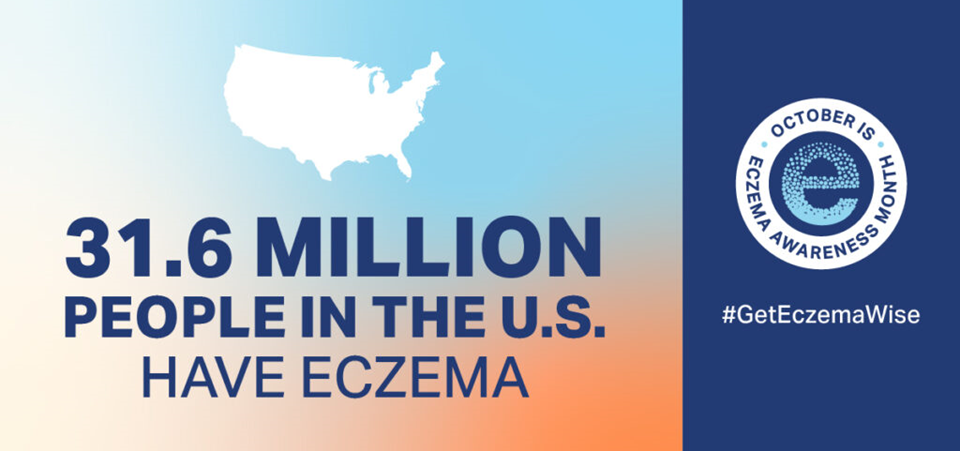
2) The scope of our analysis
Our social media intelligence analyst, Habib Mbacke, analyzed the conversations happening around the 2021 Eczema Awareness Month in the USA and compared them to 2020 event discussions and the level of discussion in the rest of the year. The goal of this study is to understand what was the reaction online to the campaign and the topic of discussions shared by people affected by this condition. (2)
- The scope of the analysis is focused on mentions in English coming Worldwide.
- There were a total of 2,707 mentions from patients, caregivers or HCPS recorded during the listening period from October 1st 2021 to October 31st 2021. We mostly concentrated on patients discussions in the analysis.
- A majority of mentions came from Instagram (53%) and Twitter (21%) followed by news (18%) and Tumblr (1%).
- A total of 394 unique authors were identified.
3) How did the campaign fare in terms of general visibility?
Volume of mentions: a modest increase of 5% of conversations about the eczema awareness campaign in 2021 when compared to 2020
After an initial peak at the beginning of the month corresponding with the announcement of the awareness campaign both in 2020 and in 2021, the level of conversations remained stable throughout the month. Except for a peak in mentions later in October 2021 corresponding with the publishing of a syndicated article from paediatrician Dr. Amin sharing tips on how to manage eczema in toddlers. That contributed to a slightly higher reach compared to 2020.
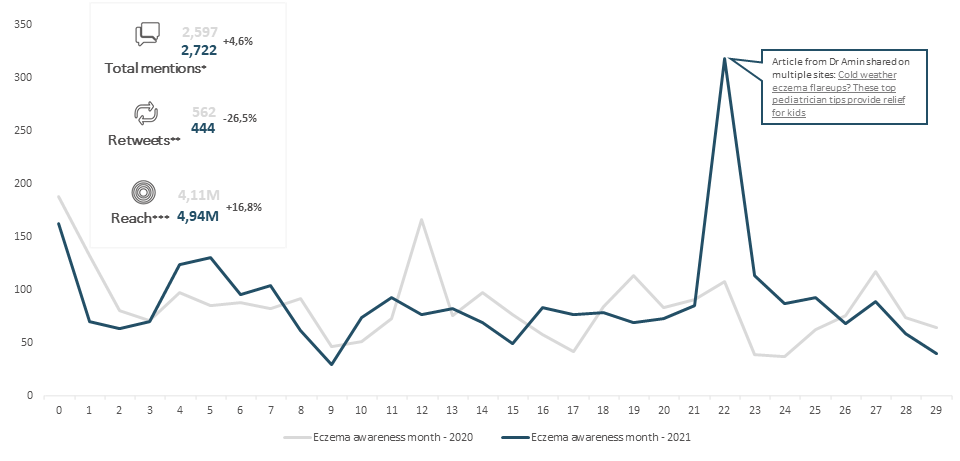

More impressions but less engagement: apart from total impressions, most engagement metrics around the broad topic of eczema were down when compared to the rest of the year average
Total impressions in October are up by 40% compared to the rest of the year 21. But the event did not create more discussions or engagement than the usual discussions over the rest of the year. The impressions were mostly linked with a post from celebrity Jessica Alba, sponsoring products geared towards sensitive skin.
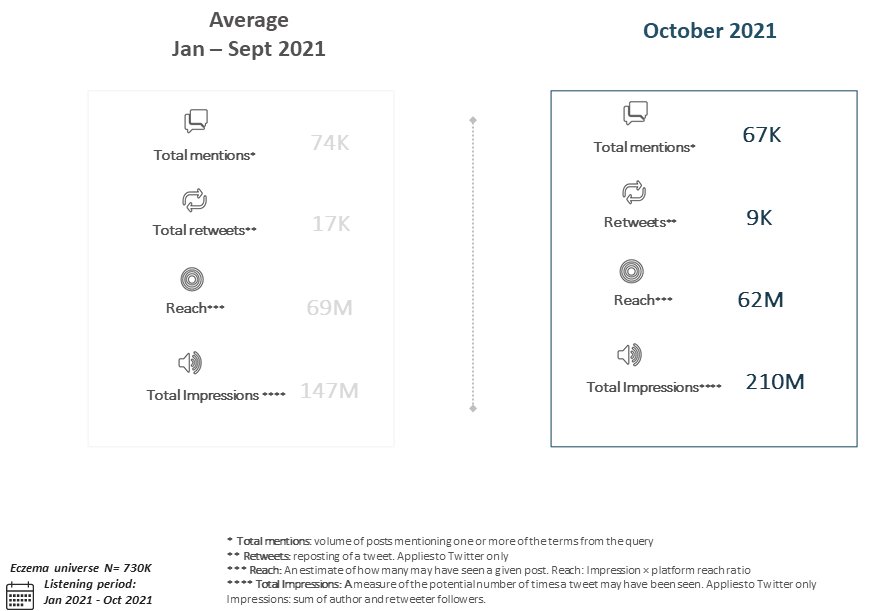
4) What did the patients say? An opportunity to gain insights from eczema sufferers
Focus on patients' conversations during Eczema Awareness Month in 2021
For patients discussing online, this event was the occasion to reminisce and reflect on past experiences and the journey completed so far with a mix of emotions alternating between feelings of joy of having made it so far or successfully addressed eczema and sadness looking back at the difficult journey traveled or still being endured.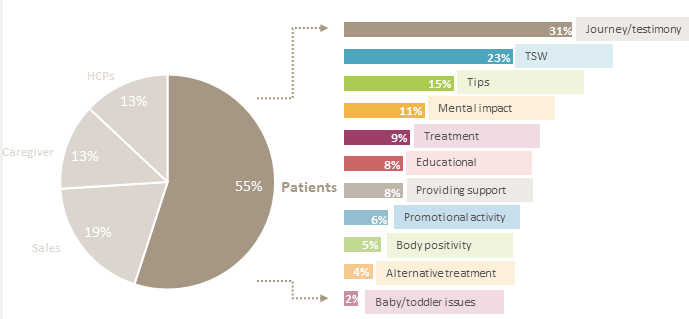
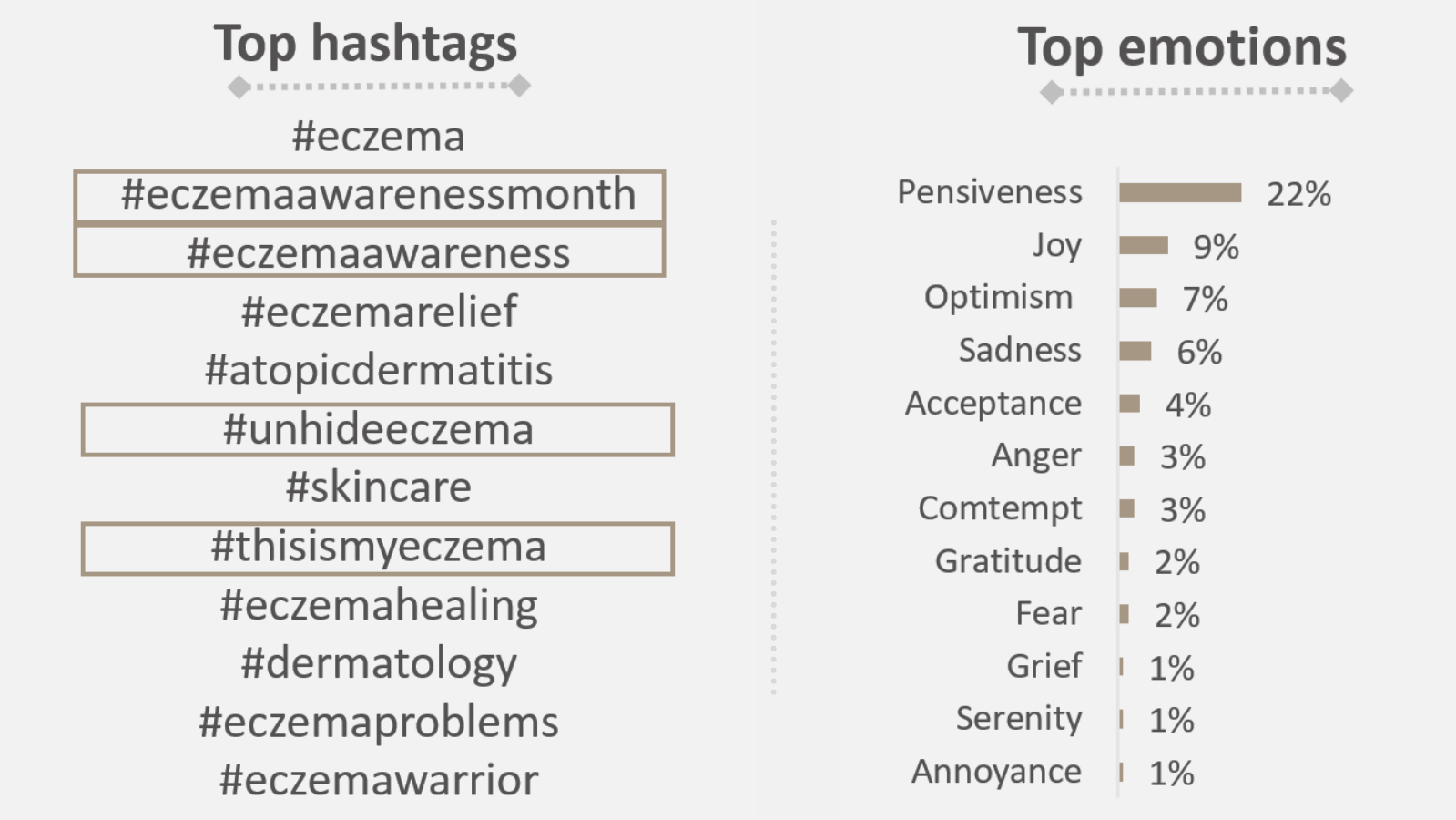
Top topics of discussion: the need to share the emotional burden that is tied with eczema
"October is Eczema Awareness Month... and it's taken me 30+ years to be comfortable in the body that suffers from it." (a patient on Instagram)
- Experience (31%): a sense of acceptance is needed
The EAM (Eczema Awareness Month) is described as cathartic by some and the occasion to both unburden themselves of the emotional weight they carry with the illness but also an occasion to help and reach out to others. Focus is often put on the chronic aspect of the illness and the challenges that come with recurring symptoms. Online patients documented the strategies - successful or not - put in place over the years to manage their condition (at the very least), up to learn to live with a degree of comfort (at best). Whatever the strategy put in place, a recurring notion is that a sense of acceptance is needed to live with eczema, though moments of doubts and emotional turmoil remain unavoidable. - Topical Steroid Withdrawal (TSW) (23%): a community against steroids
The EAM was an opportunity for TSW sufferers to document the journey they are on dealing with withdrawal symptoms, the ebbs and flows of having to deal with TSW that appears inherent when dealing with TSW. The event was an opportunity to reminisce about the journey taken whether they are still on it and trying to sort out how to manage the constant flow of progress and setback experienced, or for others who have described having dealt with the condition successfully, a celebration of having endured painful symptoms and a promise to others that there is betterment at the other side of the battle. Ultimately, TSW sufferers form a tight-knit community online with words of support and encouragement sent to each other. We will come back on that aspect in another analysis about atopic dermatitis social discussions. - Tips (15%): products to live with
Discussions around tips are focused on addressing the triggers and root causes of eczema with a focus on holistic approaches as well as sharing of favourite brands of soaps, shampoo, and moisturizers but also household items such as cleaning products (laundry product, detergent, etc..) that have personally proved to be helpful - or not - to online users. The difficulty of finding products and ingredients that work well was highlighted, requiring multiple trials and failures before finding a toolkit that works well. - Mental Impact (11%): visibility for the hidden ones
The mental impact of living with eczema is described as great sometimes even greater than physical pain in some cases. Lack of self-esteem, self-hate, and anxiety are recurring emotions that make it hard for online patients to interact with the outside world in fear of being judged for looking different. This is compounded by a history of bullying for some. Temptation is therefore great to hide oneself and cover as much as possible to avoid judgment. This emotional turmoil has sent some online users to the path of introspection and spiritual healing, leading to more acceptance and changed perspectives about the illness, its causes, and more holistic ways of dealing with the psychological aspect of eczema. This also ties into recent movements of body positivity where online users are encouraging themselves and others to be more accepting of the way they look and counterbalance negative emotions with self-love and openness.
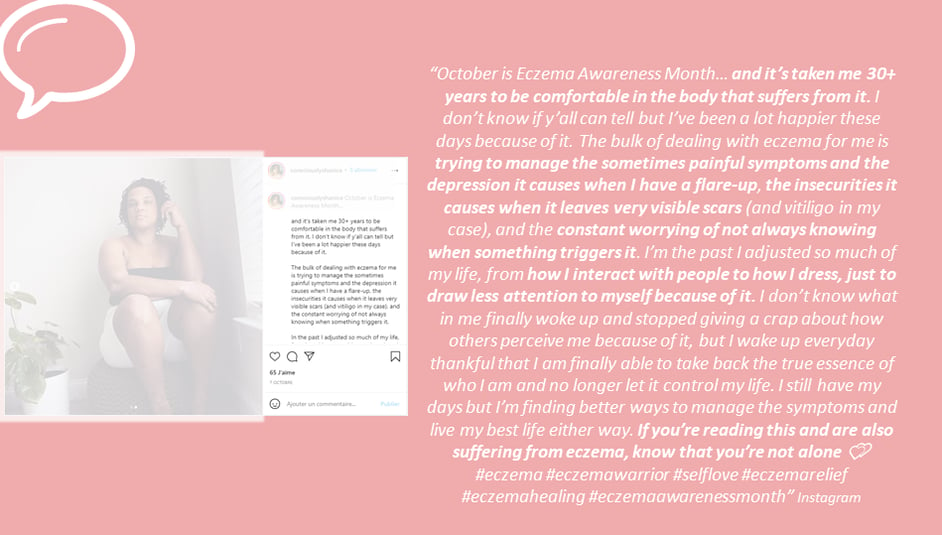
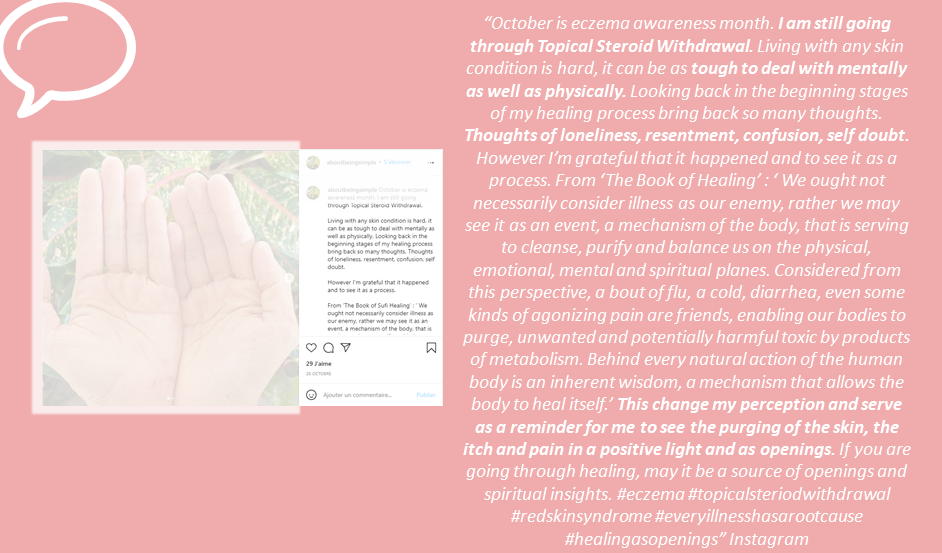
Conclusions
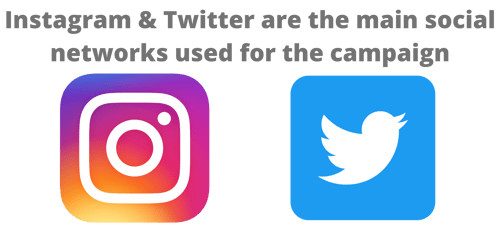 Instagram is the platform of choice for patients to share their journey and the emotional aspect of their illness.
Instagram is the platform of choice for patients to share their journey and the emotional aspect of their illness.
Twitter was used by brands to relay their messaging. Personal conversations there were more contemptuous and controversial in tone with some rejecting some of the messaging conveyed.
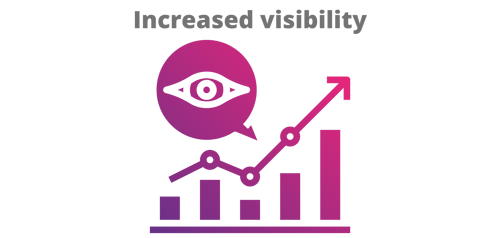 What helped the 2021 eczema awareness campaign reach greater visibility in terms of impression and reach was the willingness from some brands to integrate current societal issues, namely inclusivity by highlighting issues patients with skin of color can face when it comes to eczema. This resulted in greater engagement and potential exposure because of increased media relay.
What helped the 2021 eczema awareness campaign reach greater visibility in terms of impression and reach was the willingness from some brands to integrate current societal issues, namely inclusivity by highlighting issues patients with skin of color can face when it comes to eczema. This resulted in greater engagement and potential exposure because of increased media relay.
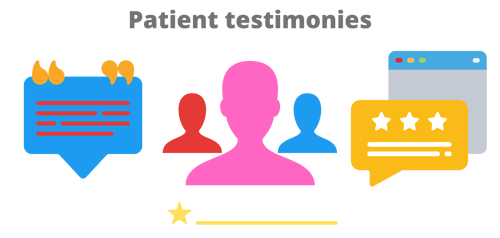 The event was the occasion for eczema sufferers to air out their concerns but also provide solidarity and encouragement to others. Often emotional in tone, the event was seized to expose the difficulties and successes of dealing with treatments, strategies to manage the illness, issues of self-esteem, and body positivity. Listening to those conversations online are a great way to capture patients’ authentic emotions.
The event was the occasion for eczema sufferers to air out their concerns but also provide solidarity and encouragement to others. Often emotional in tone, the event was seized to expose the difficulties and successes of dealing with treatments, strategies to manage the illness, issues of self-esteem, and body positivity. Listening to those conversations online are a great way to capture patients’ authentic emotions.
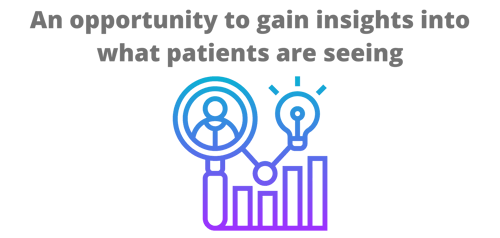 This listening exercise highlighted the importance of staying on top of what patients are sharing online. Topical steroid withdrawal for example is a potent subject of conversation on social media and can possibly influenced greatly patients that are looking for information about steroid treatments. We will soon come back on that aspect with a specific in-depth analysis.
This listening exercise highlighted the importance of staying on top of what patients are sharing online. Topical steroid withdrawal for example is a potent subject of conversation on social media and can possibly influenced greatly patients that are looking for information about steroid treatments. We will soon come back on that aspect with a specific in-depth analysis.
Sources: (1)National Eczema Association https://nationaleczema.org/, (2) APLUSA social media analysis

-png.png)

